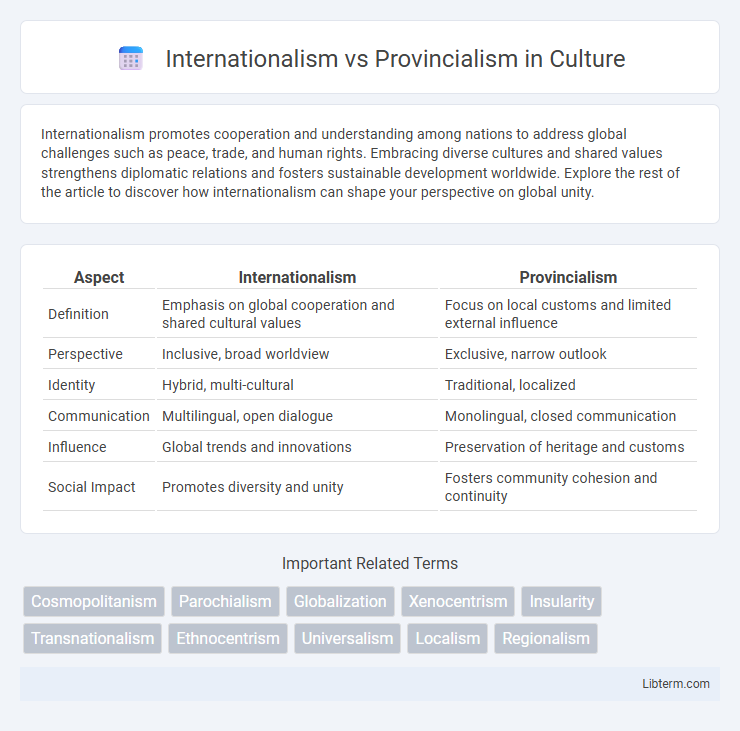Internationalism promotes cooperation and understanding among nations to address global challenges such as peace, trade, and human rights. Embracing diverse cultures and shared values strengthens diplomatic relations and fosters sustainable development worldwide. Explore the rest of the article to discover how internationalism can shape your perspective on global unity.
Table of Comparison
| Aspect | Internationalism | Provincialism |
|---|---|---|
| Definition | Emphasis on global cooperation and shared cultural values | Focus on local customs and limited external influence |
| Perspective | Inclusive, broad worldview | Exclusive, narrow outlook |
| Identity | Hybrid, multi-cultural | Traditional, localized |
| Communication | Multilingual, open dialogue | Monolingual, closed communication |
| Influence | Global trends and innovations | Preservation of heritage and customs |
| Social Impact | Promotes diversity and unity | Fosters community cohesion and continuity |
Defining Internationalism and Provincialism
Internationalism emphasizes global cooperation, cultural exchange, and collective responsibility beyond national borders, promoting policies that support interconnectedness and mutual understanding among nations. Provincialism centers on local or regional interests, often prioritizing traditional values, local customs, and limited external engagement, leading to a focus on self-sufficiency and regional identity. The tension between these paradigms shapes political, social, and economic strategies worldwide, influencing globalization and nationalism dynamics.
Historical Evolution of Internationalism
Internationalism emerged as a response to the limitations of provincialism, gaining momentum during the late 19th and early 20th centuries amid growing globalization and the aftermath of world wars. Key developments in the historical evolution of internationalism include the establishment of the League of Nations in 1919, followed by the United Nations in 1945, both designed to promote global cooperation and prevent conflicts. The shift from localized, provincial concerns to broader international perspectives also coincided with decolonization, the Cold War, and the rise of multinational institutions shaping economic, political, and cultural integration.
Roots and Rise of Provincialism
Provincialism emerged as a reaction to the rapid globalization and homogenization brought by internationalism, rooted in local identity, cultural preservation, and resistance to external influences. Its rise can be traced to socio-political movements emphasizing regional autonomy, heritage, and economic protectionism against perceived threats from global integration. This tension highlights the ongoing conflict between embracing global interconnectedness and maintaining distinct local traditions and values.
Key Differences Between Internationalism and Provincialism
Internationalism promotes global cooperation, cultural exchange, and interconnectedness by prioritizing shared goals beyond national borders. Provincialism emphasizes local traditions, values, and interests, often resisting external influences to preserve regional identity. The key difference lies in internationalism's expansive worldview fostering inclusivity, whereas provincialism focuses on localized loyalty and limited external engagement.
Advantages of Embracing Internationalism
Embracing internationalism fosters cultural exchange, driving innovation and broadening perspectives in education, business, and diplomacy. It enhances economic growth by opening global markets, attracting diverse investments, and facilitating cross-border collaborations. Internationalism also promotes peace and mutual understanding by encouraging dialogue and cooperation among nations, reducing conflicts and fostering global stability.
Challenges and Criticisms of Provincialism
Provincialism faces challenges such as limited worldview, resistance to cultural diversity, and insularity that hinder social and economic progress in an interconnected world. Critics argue that provincialism often leads to parochial attitudes, obstructing innovation and cross-cultural collaboration necessary for addressing global issues. The narrowing of perspectives under provincialism can exacerbate misunderstandings and conflicts between local and international communities.
The Impact on Culture and Identity
Internationalism fosters cultural exchange and hybrid identities by promoting openness to global influences, enriching local traditions with diverse perspectives. Provincialism emphasizes the preservation of unique cultural heritage and localized identities, resisting homogenization from global trends. The tension between these forces shapes cultural evolution, influencing how communities define themselves in an interconnected world.
Internationalism vs Provincialism in Global Politics
Internationalism promotes cooperation among nations through institutions like the United Nations and supports policies addressing global challenges such as climate change and human rights. Provincialism emphasizes local or national interests, often resisting external influence and prioritizing sovereignty over multilateral agreements. The tension between internationalism and provincialism shapes global politics, influencing diplomatic strategies, trade policies, and conflict resolution efforts worldwide.
Case Studies: Real-World Examples
The tension between internationalism and provincialism manifests in case studies such as the European Union's integration efforts clashing with nationalist movements in Hungary and Poland, where local identities resist supranational policies. In contrast, global cities like New York and Singapore exemplify internationalism through their multicultural economies and transnational governance structures that prioritize global connectivity. These examples highlight how economic interdependence and cultural exchanges challenge provincialism's emphasis on localized traditions and governance.
Navigating the Future: Striking a Balance
Navigating the future requires striking a balance between internationalism, which promotes global cooperation and cultural exchange, and provincialism, which emphasizes local identity and community values. Embracing internationalism fosters innovation and economic growth through diverse perspectives, while provincialism preserves heritage and social cohesion. Effective strategies integrate global awareness with respect for local traditions, ensuring sustainable development and inclusive progress.
Internationalism Infographic

 libterm.com
libterm.com